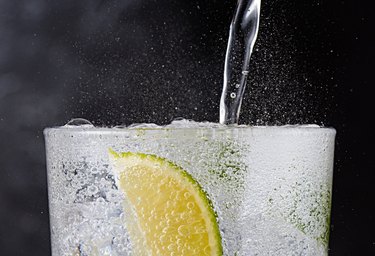
You might not realize it, but if you have lung damage or conditions like asthma or chronic obstructive pulmonary disease (COPD), your health can be impacted by the effects of carbonated drinks on your lungs. Before you open your next soda, here's why you might want to skip carbonated beverages.
Video of the Day
Video of the Day
Pop Pop, Fizz Fizz
You probably know that snuffing out smoking and getting more exercise are both important lifestyle factors for optimizing your pulmonary health. But what about what you drink?
If you drink carbonated beverages like soda or seltzer, you may be surprised to learn that those drinks make the American Lung Association (ALA) list of things you should avoid if you have lung conditions such as asthma.
Per the ALA, these bubbly bevvies cause gas, which can make breathing more difficult, causing tightness in your chest or even triggering your asthma to flare up. Thus, ALA says, while there is no specified diet for asthma, if you have the condition, you should avoid gas-causing dietary triggers like carbonation (as well as fried foods and foods like onions, garlic and beans).
Brooklyn, New York-based Jorge M. Mercado, MD, associate section chief of Pulmonary, Critical Care & Sleep Medicine at NYU Langone Hospital, adds inflammation to that inventory of reasons you may want to avoid these drinks for lung health.
"Carbonated beverages can increase the levels of inflammation," Dr. Mercado says, "and it has been suggested in at least one study to potentially increase the risk of asthma." But, he adds, if you don't already have lung problems, there may be no need to sound the alarm. "In individuals without existing lung problems, there has not been any negative implications with the consumption of carbonated beverages and lung conditions," Dr. Mercado says.
Carbonation and COPD Don’t Mix Well
What's in your drink on top of the fizz may also deserve some attention. Rockville Centre, New York-based Frank S. Coletta, MD, associate director of the Sleep Center at Mount Sinai South Nassau, says that some of the added ingredients in sodas and other carbonated beverages may pose some additional issues for lung health.
"I recommend that patients with asthma or COPD refrain from drinking carbonated beverages," Dr. Coletta says, "because the lungs of these patients have limited capacity to cope with the increased level of inflammation caused by some of the ingredients in soda." Those problematic ingredients, he notes, include sodium benzoate and high fructose corn syrup.
If you have COPD specifically, the Cleveland Clinic says that carbonated beverages that contain caffeine should also be avoided as a means of daily hydration. In this case, it's primarily due to the fact that many carbonated beverages contain caffeine, which can interfere with some COPD medications.
Instead of those effervescent beverages, the Cleveland Clinic recommends that if you have COPD, drinking six to eight glasses of water or other noncaffeinated beverages daily is a better way to hydrate.
The Bottom Line on Bubbles
Beyond the impact those bubbles you sip have on your lungs as a result of gas, bloating, inflammation and caffeine, their effect on your weight is another aspect that can potentially affect your lung health.
Explains Browns Mills, New Jersey-based Andrew Martin, MD, chair of the Department of Pulmonary Medicine at the Deborah Heart and Lung Center: "Carbonated beverages, in addition to the effects of caffeine, would exert their effect on lung health mainly through weight gain."
While carbonated beverages do appear to pose some mild risks to lung health and respiratory function, particularly for people with asthma or COPD, Dr. Mercado says the reality is that they don't seem to be a major lung risk factor for most people.
Overall, on the list of lifestyle changes you should make to take care of your lungs, carbonated beverages fall well below important steps such as quitting smoking, exercising regularly, eating a healthy diet and managing your weight, Dr. Mercado says.
Read more: Sparkling Water Versus Regular Water
- American Lung Association: “Asthma and Nutrition: How Food Affects Your Lungs”
- Cleveland Clinic: “Nutritional Guidelines for People With COPD”
- Frank S. Coletta, MD, FCCP, FAASM, chief, critical care; associate director, Sleep Center, Mount Sinai South Nassau, Rockville Centre, New York
- Andrew Martin, MD, chair, Department of Pulmonary Medicine, Deborah Heart and Lung Center, Browns Mills, New Jersey
- Jorge M. Mercado, MD, associate section chief, Pulmonary, Critical Care & Sleep Medicine, NYU Langone Hospital, Brooklyn, New York
Is this an emergency? If you are experiencing serious medical symptoms, please see the National Library of Medicine’s list of signs you need emergency medical attention or call 911.